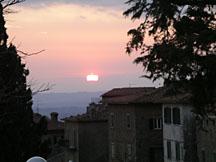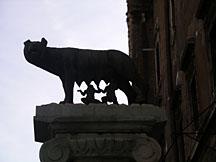“A man to leave Italy and not to write a book about it! Was ever such a thing heard of?” – Walter Landor
For the past three years, the University of Georgia has offered creative writing classes in Cortona, Italy. This spring, the focus is on travel writing, with students creating a scrapbook that contains stories, poems, letters and emails, portraits, photographs, caffeinated raves and late-night ramblings.
 In Latin, the verb “recordere” means “to return to the heart,” to never forget the “dream that keeps returning for the rest of your life” (Anna Akhamatova on Italy). The Italian charm is literally intoxicating. If America is Apollo, the god of light, order and individuality, then Italy is Dionysus, the god of wine, chaos and community. The son of immortal Zeus and mortal Semele, born of both man and of woman, Dionysus is ripe with paradox: beautiful and ugly, creative and destructive – makes friends both hug and slug each other. “The familiar stranger,” Dionysus ignores distinctions of class, gender or age. You can spend over $1000 for a good bottle of Dionysus, or 70 cents for a nice box.
In Latin, the verb “recordere” means “to return to the heart,” to never forget the “dream that keeps returning for the rest of your life” (Anna Akhamatova on Italy). The Italian charm is literally intoxicating. If America is Apollo, the god of light, order and individuality, then Italy is Dionysus, the god of wine, chaos and community. The son of immortal Zeus and mortal Semele, born of both man and of woman, Dionysus is ripe with paradox: beautiful and ugly, creative and destructive – makes friends both hug and slug each other. “The familiar stranger,” Dionysus ignores distinctions of class, gender or age. You can spend over $1000 for a good bottle of Dionysus, or 70 cents for a nice box.
In February, when we arrive in Rome, the weather is warm. We spend five days seeing the sights of the citta eterna – the Coliseum, the Forum and the Vatican – before heading on to Florence, to see the works of Michelangelo, Leonardo and other mutant ninja turtles who happen to speak Italian on the television set. At every bar we hear “Hey Ya!” The Italians can’t get enough of George Michael. My friend Giorgio says he never knew he was gay, he just thought he was British.
After a week of travels, we arrive in Cortona, and when we step off the bus, the locals are there to greet us. They are always friendly. When you like your home, you tend to like its visitors. Three thousand years ago, the Etruscans built Cortona on top of a mountain, and the views are straight ridiculous: the fertile Valdichianna, the mountains of Siena, Lake Trasimeno, where Hannibal defeated the Romans in 217 B.C. One young man faints. Another young lady says a million tiny angels are gnawing on her arm.
Since the days of the Etruscans, the spirit of Cortona has attracted myriad artists and visionaries. In 1211, St. Francis came to Cortona and founded his third monastery just three kilometers away, built into the side of a mountain, next to a brook. Inside the gates there is a vineyard with cheeps teeming, and when you hear them, their high-pitched allegro, you know why he preached to them. Cortona is also the home of Gino Severini, who completed a twelve mosaic Via Crucis (1947) where you reflect on Christ’s passion as you struggle up the mountain. And a struggle it is. There is not an old lady in town without great looking legs.
Students now can take art history, painting, photography, drawing, printmaking, bookmaking, ceramics and creative writing. The workload is intense, from seven to seven, but each night we break for a seven-course meal at the nicest restaurant in town. Everything is fresh. I have never eaten so well.
“I travel to learn,” Mark Twain once said. The world will never be homogeneous because the global is always interpreted through the local. One night, I hang out with an Australian dude in an Italian bar called Route 66 when we see a black guy wearing a tee-shirt that says “England” in French. There are three bars in town where young and old hang out and where everybody knows everybody. There is a bakery (that I shouldn’t tell you about because it must remain a secret) where late at night you can get pizza hot out of the oven.
 On Saturdays, we take field trips to surrounding cities. Wednesday and Sunday are free, but in Italy doing nothing is never doing nothing. At six, everyone gets all dressed up for the “passagiatta,” the promenade through town. On Sunday, Italians go to mass; on Saturdays to the Church of the Holy Prada. I am excited about Easter but know that it is during the holidays when we miss our families the most.
On Saturdays, we take field trips to surrounding cities. Wednesday and Sunday are free, but in Italy doing nothing is never doing nothing. At six, everyone gets all dressed up for the “passagiatta,” the promenade through town. On Sunday, Italians go to mass; on Saturdays to the Church of the Holy Prada. I am excited about Easter but know that it is during the holidays when we miss our families the most.
The ancient Italians believed in the genius loci, that every place on earth had its own unique spirit. This is my second spring in Cortona, and I don’t want to leave. But one of the best parts of traveling is returning home. “The real voyage of discovery does not consist of seeking new landscapes, but of having new eyes” (Marcel Proust).
It wasn’t until I left the Classic City that I fully appreciated the genius of Athens. And so, come September, I’ll be outside the 40 Watt relishing one of JB’s dogs with the world famous “come-back” sauce. And inside, the Krush Girls will be rocking a full house, and we’ll dance till our clothes are deliciously sweaty, and then all sleep easier knowing that the sun will be shining and the Dawgs will be victorious and we’ll be cheering them on in our bright red britches. If everyone wore bright red britches, the English writer D.H. Lawrence wrote, much of the world’s suffering would be relieved. Lawrence was wrong about numerous things, but on the subject of red britches never spoke a greater truth.
Spenser Simrill teaches creative writing in Athens and in Cortona. For more information on Cortona Studies Abroad please visit art.uga.edu/programs/studies-abroad/cortona. For further reading, see Luigi Barzini’s The Italians and Barbara Grizzuti Harrison’s Italian Days.
Like what you just read? Support Flagpole by making a donation today. Every dollar you give helps fund our ongoing mission to provide Athens with quality, independent journalism.






